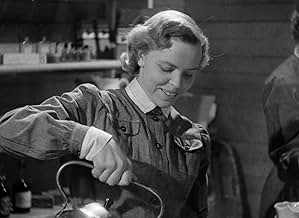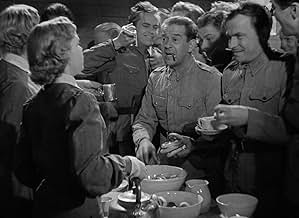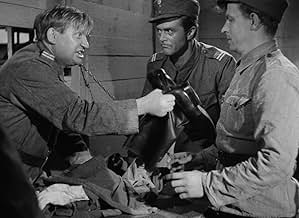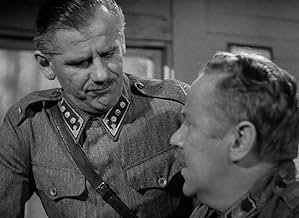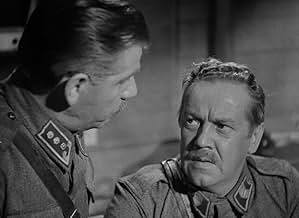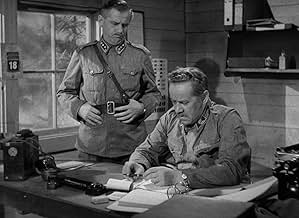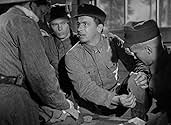The tale of a platoon of soldiers during the Continuation War. Based on Väinö Linna's book of the same name.The tale of a platoon of soldiers during the Continuation War. Based on Väinö Linna's book of the same name.The tale of a platoon of soldiers during the Continuation War. Based on Väinö Linna's book of the same name.
- Director
- Writers
- Stars
- Nominated for 1 BAFTA Award
- 7 wins & 1 nomination total
- Director
- Writers
- All cast & crew
- Production, box office & more at IMDbPro
Featured reviews
Tuntematon sotilas (The Unknown Soldier) is an epic story and part of Finland's history. The movie is based on famous Finnish novel by Väinö Linna, and it is set in the Continuation War (1941-44), just about a year after the Winter War, between Finland and Soviet Union. The movie is fully black and white.
The Unknown Soldier focuses on a very diverse group of soldiers and is packed with black humour. The different Finnish dialects, that make a huge part of the fun in the jokes, are understandable only for people who know Finnish, but the overall feeling is there in the amazing acting by Reino Tolvanen (Rokka), Kosti Klemelä (Koskela) and Pentti Siimes (Määttä) - to name a few. The most powerful scene is probably the one where Lehto, Määttä and Rahikainen are stubbornly serving their disciplinary duty after refusing to obey their superiors - directly under the enemy aerial fire.
The Unknown Soldier is one of the most realistic war movies ever made. It shows the horrible facts: people die for their home land and it's not pretty. The Finnish soldiers fight against the tenfold enemy in impossible situations. They made heroic acts in their attempt to save their country, and many of these acts have been captured brilliantly in the movie as well. But the true fact of war - death - is always around, even among the war heroes. War does not make one great.
The teaching of The Unknown Soldier is that even a small country has a chance in war against an impossible enemy if the will to protect the homeland is strong enough, the people are stubborn enough and are ready to die for freedom.
The main music in the film - Jean Sibelius' Finlandia is legendary.
The Unknown Soldier focuses on a very diverse group of soldiers and is packed with black humour. The different Finnish dialects, that make a huge part of the fun in the jokes, are understandable only for people who know Finnish, but the overall feeling is there in the amazing acting by Reino Tolvanen (Rokka), Kosti Klemelä (Koskela) and Pentti Siimes (Määttä) - to name a few. The most powerful scene is probably the one where Lehto, Määttä and Rahikainen are stubbornly serving their disciplinary duty after refusing to obey their superiors - directly under the enemy aerial fire.
The Unknown Soldier is one of the most realistic war movies ever made. It shows the horrible facts: people die for their home land and it's not pretty. The Finnish soldiers fight against the tenfold enemy in impossible situations. They made heroic acts in their attempt to save their country, and many of these acts have been captured brilliantly in the movie as well. But the true fact of war - death - is always around, even among the war heroes. War does not make one great.
The teaching of The Unknown Soldier is that even a small country has a chance in war against an impossible enemy if the will to protect the homeland is strong enough, the people are stubborn enough and are ready to die for freedom.
The main music in the film - Jean Sibelius' Finlandia is legendary.
The movie is based on a brilliant and realistic book (Unknown soldier) about the "Continuation War" between Finland and Soviet Union from 1941 to 1944.
After the initial fast attack phase the war turns into sleepy trench warfare (1942-44), then (1944)the company has to retreat and finally stop the storming Red Army forces. There exists a wide spectrum of characters from cowards to heroes, from peasant rank-and-file soldiers to cocky officers. The scale in personalities and changing situations of war, which are credibly described, makes the movie a spectacle.
It helps a lot if one knows some of the underlying history, but the story is rather universal tale of the cruelty of war and the men who have to live and die for their country and different motives. The language with dialects is versatile, but in Finnish only. This old version (1955) is in my opinion better than the later one (1985).
After the initial fast attack phase the war turns into sleepy trench warfare (1942-44), then (1944)the company has to retreat and finally stop the storming Red Army forces. There exists a wide spectrum of characters from cowards to heroes, from peasant rank-and-file soldiers to cocky officers. The scale in personalities and changing situations of war, which are credibly described, makes the movie a spectacle.
It helps a lot if one knows some of the underlying history, but the story is rather universal tale of the cruelty of war and the men who have to live and die for their country and different motives. The language with dialects is versatile, but in Finnish only. This old version (1955) is in my opinion better than the later one (1985).
10vassell
There is no better war-film ever made in history. This ruthless Saga of Finland struggling against former Super Power of the world is just heavy true story. You can almost feel the fear in finnish soldiers who are doing all they can to stop russians march. Movie is fullfilled with black humor what is so common even todays finns behaviour, when they find themselves in though position. I watch this movie every year, cause I like it so much, and I´m not even a patriot or like so much about war movies in general. I recommend this movie to all. "Tuntematon sotilas" (The Unknown Soldier) is a made from the book with same name on it and I think book is even better, but of course you can´t ever compete with a movie against book (Sorry about my poor english).
The Unknown Soldier is really more than just a movie. It is a monument. The two wars between Finland and Soviet is so deeply rooted in the mythology of the Finnish country that it would be utterly pointless to limit yourself to the pure cinematic qualities, if you were to appreciate this film. The film really embodies a cinematic continuation of a big statue honoring the soldiers that fought and died in these battles, carved in stone to stand forever. To this day, this is still the most successful Finnish film ever made, and Finnish TV has been airing it every Independence day for over a decade. And that is only the movie, which despite all it's values is most important as an appendix to Väinö Linnä's classic novel of the same name. The 1954 novel is truly a masterpiece of realistic fiction, and the film is really just following it's trails. It is a fine war epic, but all it's virtues stem from the original novel. That is why I'm making a point of how to approach this film. This isn't just a story about the war, this is a film about a country, being important in itself, depicting a unique piece of Finnish history exclusive for Finland.
That being said, the big thing that the film brings onto the viewer is it's big heart. This is an epic in the most classic of fashions, presenting a kind of sentimental warmth and heartbreaking honesty that only cinema can create. The psychological reality of the novel is apparent in it's narrative, using no main characters but various ones, all diverse, realistic and totally present. Film is a medium that can't really enter the human mind with such piercing accuracy, thus the film takes use of some astonishing actors letting them hammer out their characters with spellbinding presence. To say that the film is character driven isn't really accurate, it's character BASED. When we meet our first batch of characters, we expect their happy smiles to be turned into war torn frowns. But the jokers of the group insist on keeping the mood as good as possible, no matter what fate may fall upon them. One of them, the cheerful Koskela (Kosti Klemälä) even ends up becoming Sergeant after a death-defying attack on a tank, but it's no big deal as long as they don't call him 'Sir'. Other characters are more serious minded, like Rokka (Reino Tolvanen), a man twice the age of most of the other soldiers, who's got wife and children at home. He is humorous and lovable, yet fearless and completely consequent in his role as a fighter, and he has only contempt for his so-called duty of discipline. He is the best soldier in the group, we learn, yet the biggest problem for the higher ranks who disapprove of his ways. Tolvanen is furious in the role, almost resembling a Finnish Toshiro Mifune, becoming the unified center of the soldier's morality.
These are just two examples of many characters that come and go during the film. I feel I have to mention the great Åke Lindman who portrays Lehto, a nihilist killing machine who seems to have leather skin and a heart of stone. As a dark version of Clint Eastwood he will never laugh, never cry, and he will defy death until the day it gets the better of him. Yet, as stereotypical as these characters may seem, you are never quite sure if they really are as happy, brave, cowardly or honest as they seem - indeed, in Linna's original version of the novel, Lehto was portrayed as a suicidal psychopath.
Running for three hours without a traditional plot narrative, The Unknown Soldier is filled with memorable sequences worthy that of a proper epic. One short scene involves three soldiers exchanging words with two Russian women, ending up with a wild Kalinka dance. In another sequence, all the soldiers get drunk and have a party when they should be on guard for enemies and, as it happens, they are lucky enough not to get ambushed by any russians. In one scene the soldiers witness an execution to warn them about the dangers of disobedience. In another, three soldiers punished with two hours of standing guard hold their stand despite bomb planes are hovering above them, attacking the camp.
These are basically war stories, anecdotes strung together and you get the feeling the film might as well keep telling them for another three hours, because the well doesn't dry up. These stories are the body of the Finnish war history, and for every soldier who fought in the war there's bound to be hundreds. These are as good as any, and it is when you consider the weight of this event that it becomes clear just what a monument the film is. The music seals the legacy - Jean Sibelius' opus for the epic, Finlandia.
That being said, the big thing that the film brings onto the viewer is it's big heart. This is an epic in the most classic of fashions, presenting a kind of sentimental warmth and heartbreaking honesty that only cinema can create. The psychological reality of the novel is apparent in it's narrative, using no main characters but various ones, all diverse, realistic and totally present. Film is a medium that can't really enter the human mind with such piercing accuracy, thus the film takes use of some astonishing actors letting them hammer out their characters with spellbinding presence. To say that the film is character driven isn't really accurate, it's character BASED. When we meet our first batch of characters, we expect their happy smiles to be turned into war torn frowns. But the jokers of the group insist on keeping the mood as good as possible, no matter what fate may fall upon them. One of them, the cheerful Koskela (Kosti Klemälä) even ends up becoming Sergeant after a death-defying attack on a tank, but it's no big deal as long as they don't call him 'Sir'. Other characters are more serious minded, like Rokka (Reino Tolvanen), a man twice the age of most of the other soldiers, who's got wife and children at home. He is humorous and lovable, yet fearless and completely consequent in his role as a fighter, and he has only contempt for his so-called duty of discipline. He is the best soldier in the group, we learn, yet the biggest problem for the higher ranks who disapprove of his ways. Tolvanen is furious in the role, almost resembling a Finnish Toshiro Mifune, becoming the unified center of the soldier's morality.
These are just two examples of many characters that come and go during the film. I feel I have to mention the great Åke Lindman who portrays Lehto, a nihilist killing machine who seems to have leather skin and a heart of stone. As a dark version of Clint Eastwood he will never laugh, never cry, and he will defy death until the day it gets the better of him. Yet, as stereotypical as these characters may seem, you are never quite sure if they really are as happy, brave, cowardly or honest as they seem - indeed, in Linna's original version of the novel, Lehto was portrayed as a suicidal psychopath.
Running for three hours without a traditional plot narrative, The Unknown Soldier is filled with memorable sequences worthy that of a proper epic. One short scene involves three soldiers exchanging words with two Russian women, ending up with a wild Kalinka dance. In another sequence, all the soldiers get drunk and have a party when they should be on guard for enemies and, as it happens, they are lucky enough not to get ambushed by any russians. In one scene the soldiers witness an execution to warn them about the dangers of disobedience. In another, three soldiers punished with two hours of standing guard hold their stand despite bomb planes are hovering above them, attacking the camp.
These are basically war stories, anecdotes strung together and you get the feeling the film might as well keep telling them for another three hours, because the well doesn't dry up. These stories are the body of the Finnish war history, and for every soldier who fought in the war there's bound to be hundreds. These are as good as any, and it is when you consider the weight of this event that it becomes clear just what a monument the film is. The music seals the legacy - Jean Sibelius' opus for the epic, Finlandia.
I haven't ever heard such incomprehensible gibberish in my life. The Unknown Soldier (Tuntematon Sotilas) is not Soviet propoganda but a poignant and still very relevant look at the inhumanity of war. It is probably the only film that takes place during the little known Continuation War (1941-44), the sequel to the also little known Winter War (1939-40). Unlike Talvisota, the other great Finnish war movie, some knowledge of the chronology and background to this conflict is required. In 1941, Finland mobilized its forces along the 1940 armistice line incurring the wrath of the Soviet Union which bombed several Finnish cities in response. Operation Barbarossa, the German invasion of the Soviet Union, began shortly after. With most Soviet forces tied down in defending the motherland against the Germans, Finland seized the opportunity and reoccupied the land it had lost in the previous war. The plucky Finns made significant gains until the war entered its 'static phase' with neither side giving or taking any ground for nearly 2 years. The Finns did, however, refuse to link up with the Germans at Stalingrad which consequently may have cost Germany (and Finland) the war. There was a color remake of this film but in my opinion, this appears to be the superior version. If you can get a copy of the novel in English, I would recommend reading that as well.
Did you know
- TriviaThe film has been traditionally shown on TV in Finland every year on Independence Day (December 6) since the year 2000.
- ConnectionsEdited into Juoksuhaudantie (2004)
- SoundtracksFinlandia
by Jean Sibelius
- How long is The Unknown Soldier?Powered by Alexa
Details
- Release date
- Country of origin
- Language
- Also known as
- The Unknown Soldier
- Filming locations
- Production company
- See more company credits at IMDbPro
Box office
- Budget
- FIM 46,667,761 (estimated)
- Runtime2 hours 57 minutes
- Color
- Aspect ratio
- 1.37 : 1
Contribute to this page
Suggest an edit or add missing content


